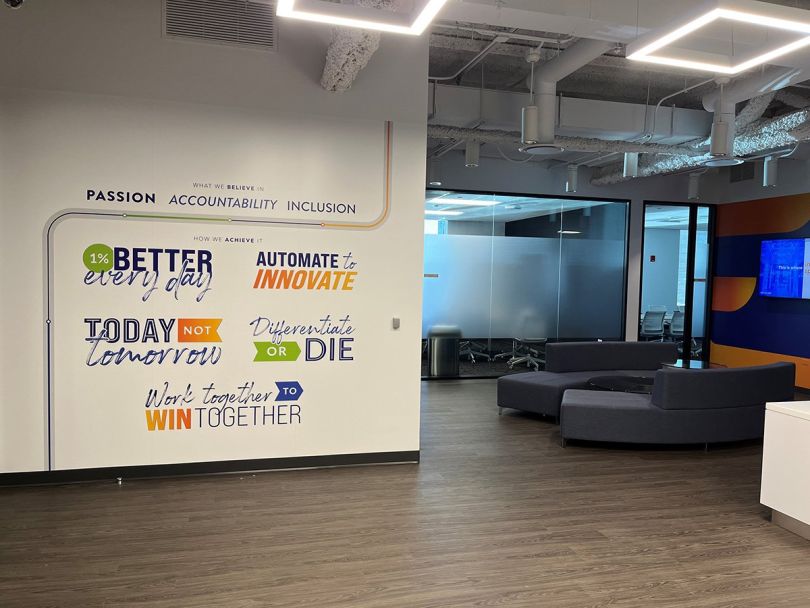There is a particular F-word that tends to pop up while navigating the challenges of hybrid work.
It’s a familiar scenario. Half of a department sits awkwardly in a conference room while a brave teammate, muttering expletives, troubleshoots audio problems as the remote employees watch impotently from the video screen. Or conversely, the organization looks on from a strange, glitching camera angle while a remote presenter frustratedly checks their computer settings. Or worst of all, the in-office team is treated to a fun on-site experience while their remote counterparts are offered a sorry consolation prize, invoking scandalous whispers of “F— this!”
Many companies are facing these challenges as the future of work changes shape, incorporating the benefits of real-life collaboration with the flexibility of remote work environments into a tricky model that attempts to blend the best of both worlds. In fact, according to a recent Gallup Poll, 53 percent of workers expect a hybrid arrangement moving forward. So companies need to figure out how to make it work, now.
53 percent of workers expect a hybrid arrangement moving forward.
The people at Pricefx also use a lot of F-words when it comes to hybrid work — though they aren’t the words you’re imagining. “The prerequisite for hybrid work is trust, and being fast, flexible, friendly and fair. We are those F-words,” said SVP of People and Culture Daniela Hylmarová.
The Chicago-based price management software company had a lead on building an effective hybrid work model, offering a remote-first environment before the Covid-19 pandemic forced the world into lockdown. At the core of its model, employees choose what works best for them and IT ensures they’re properly set up. The pillar of this practice is the trust that each team knows what it needs to function and gets equitable, friendly support from the company in meeting those needs.
“There are no hard rules about how often they must come into the office. Every team decides what works best for it, its customers and the company,” said Hylmarová.
As companies continue to perfect the new model of working, Built In Chicago connected with Hylmarová and four other local leaders to determine what contributes to a successful hybrid workplace, without any of the expletives. The throughlines are trust, feedback and iteration — here’s how they put those ideas into practice.

Epsilon is an advertising and marketing tech company.
Describe your hybrid work arrangement.
We are focused on a model that is flexible and inclusive to support our people where and how they work. We understand that different teams have different needs, so we’ve taken a team-based approach. Our offices are open for managers and employees to come in at a cadence of their choosing, for purposeful meetings, collaboration gatherings and planning sessions. There is no mandated time in the office, but we find many teams are opting to come in 2-3 days a week to connect with their peers and leaders. There is a lot of value in having the meaningful in-person conversations that aren’t as organic on video conferencing. There is mentoring and learning that goes on in these ad hoc settings, and we want to encourage that. In fact, some of the best business solutions come from these interactions. We are a values-based and results-oriented company. Whether virtually or in the office, we provide all of our employees the training and tools they need to succeed.
Why did you choose this arrangement, and how do you think it sets your organization apart as a place to work?
We arrived at a flexible approach to the future of work through employee feedback, talking to other companies and looking at what was best for Epsilon as whole. The world we work in is constantly changing, and we’ll continue to listen and remain agile. There may be changes to our approach over time, but this arrangement is working well for us. Again, we understand that different teams have different needs when it comes to where and how they work. Some teams, come into the office a couple times a week, other teams opt for strategic planning once a month or once a quarter. At several offices, we are getting very good turnout, especially Tuesday through Thursday. At Epsilon, our philosophy is that when teams get together in person it should be on purpose, with a purpose. That is how we run the entire company, from top to bottom.
The world we work in is constantly changing, and we’ll continue to listen and remain agile.”
What lessons from the pandemic and remote work in general have influenced your hybrid work model?
We certainly learned patience and the ability to adapt, given all of the starts and stops of the pandemic. Throughout all of that, we remained focused on a model that is flexible and inclusive. Well before the pandemic, we always had a global, matrixed and distributed workforce that worked well remotely. In some cases, the pandemic broke down traditional bias and removed obstacles. It enabled us to learn how to create engagement in a remote environment. Today, an employee can feel as close to their team member in India as a colleague that would’ve been sitting in Chicago. We’ve brought our people closer together worldwide, and look forward to reconnecting with colleagues locally. Our culture is what makes us special, and a flexible approach to hybrid work is part of that.
Fishawack Health is a global commercialization services partner for companies in the health and wellness industry.
Describe your hybrid work arrangement.
Our mobile working philosophy is based on the principle that employees, with the support of the organization and their managers, should feel empowered to make the right decisions for themselves, their teams and their clients in relation to how and where they work. This fosters a greater sense of trust, ownership, and engagement, enabling individuals to do their best work. We have no set days back into the office, instead we are creating what we call connection days in our locations to encourage people to get energy from one another. Connection days could include a happy hour, taco trucks, magicians – anything our site leaders can conjure up.
The nature of our work means that teams may occasionally be required to meet in person. For different teams, the frequency of in-person meetings will vary depending on demand, time of year, and client needs. We trust leaders to make the right decisions for their teams regarding when to meet in-person to work together, and when work can be carried out efficiently and effectively apart.
Why did you choose this arrangement, and how do you think it sets your organization apart as a place to work?
In short, it’s because it’s what our people want. Through our online pulse and engagement surveys we gathered data from our people around the globe and in May 2022, we invited FH employees to give feedback on their mobile working preferences. We also ran a series of employee experience workshops to gather insights on how to improve our working practices. The feedback received has helped inform and shape the guidance outlined in this document. For example, based on feedback during one workshop, we learned that the term “mobile working” is preferred over “hybrid-” or “remote working” to truly reflect how we are working today.
While we’re considerate of what’s happening in the market, we base our decisions on what our people want, not what our competitors are doing or what someone who doesn’t know our people tells us we should be doing.
We base our decisions on what our people want, not what our competitors are doing.”
What lessons from the pandemic and remote work in general have influenced your hybrid work model?
Purpose matters. Purpose has always mattered, but the pandemic shifted people’s priorities: Suddenly people who thought they had loads of time were shown a reality when time can be taken in an instant. Now more than ever before people need a compelling purpose to give their everything at work. So, if or when you ask people to come back to a space and commit that time back to commuting or travel, you must have a clear purpose in mind — it can’t be just “because we want you back 2 days a week.”
The space and location really matter. Having aspirational working space in great locations that are easy to get to and fun to be in will be a must. You also may want to think about reducing the number of meetings you have, just going to an office space to sit on Zoom calls all day is pretty counterintuitive.
Bring the human back. Focus on bringing some joy, fun and laughter back into people’s lives. Let’s be honest, the world is a bit sucky at the moment, and locations can be used as places to escape all that and have a great time again with like-minded people. Set a social target and make sure it’s fully inclusive, not just drinks on a Thursday.

Pricefx is a cloud-based price management software.
Describe your hybrid work arrangement.
We have a bring-your-own-device policy and provide employees a monthly tax-free allowance of $240. Therefore, everyone can choose devices they like and equip their own workspace. Onboarding people remotely is handled by our people team, while IT ensures that everyone is securely and smoothly connected to our network from anywhere in the world on the first day. Our employees have the freedom to choose how often to come into the office. A large number work from home, while others enjoy our offices.
For me, working 2-3 days from the office and the remainder of the week from home is the best combination. I prefer staying home when I’m concentrating. In the office, I enjoy meeting colleagues, working together with the team, solving cross-departmental issues or connecting personally with others.
Why did you choose this arrangement, and how do you think it sets your organization apart as a place to work?
As a SaaS company, our success depends on the ability to produce deliverables from anywhere. Our teams all over the world enable us to cultivate a culture of diversity and respect. It doesn’t matter where you work or where you live. Creating value does not depend on where you work. We are committed to an ethos in which trust, flexibility, respect, and reliability play a crucial role in team engagement, motivation, and retention. This is what makes us unique.
Creating value does not depend on where you work.”
What lessons from the pandemic and remote work in general have influenced your hybrid work model?
Trusting people and letting them be their best wherever they are pays off. It is important to note that they appreciate the fact that they can continue working at home while remaining safe. Additionally, we realized that we do not need large offices to accommodate everyone, but rather a place where people can get together, work and enjoy themselves.
Intelligent Medical Objects is a healthcare data enablement company.
Describe your hybrid work arrangement.
We ask and expect our people to work in a way that allows them to do their best work — wherever and whenever that may be. Aside from obvious commitments to our clients and to each other, we are not tied to offices, desks or clocks. For us, hybrid also means identifying and then planning opportunities to connect, team up and collaborate in person. We believe in the importance of live and more meaningful engagement across the IMO workforce; and while that workforce is geographically dispersed, fueling our humanness — and our innate need to connect and commune — is central to how we work. Sometimes this happens organically, sometimes it requires more intentionality.
We expect our management team in the Chicagoland area to find their way into the office at least 2 days a week and we suggest that those visits happen Tuesday through Thursday to facilitate optimal cross-functional exposure. As management rebuilds the muscles that once got us all into the office more regularly, so will those muscles develop for all our employees. We also encourage our employees outside of Chicago to travel; and we create regional opportunities to meet with their geographic peers, to ideate, solve and create.
Why did you choose this arrangement, and how do you think it sets your organization apart as a place to work?
How we work is rooted in our culture — the behaviors, values and beliefs that comprise what our people experience every single day. For hybrid to function as planned, it needs to be a central driver to our culture. That’s why we’ve embarked on a culture evolution process — we call it IMO Connect — that engages all our employees in embracing this new way of working as a competitive advantage. Part of that includes being more explicit around how a hybrid workplace breathes life into the culture dynamics that are imperative to our success. Dynamics like: think and act like owners; help others uncover their calling and connect it to IMO’s purpose; trust, empower, get out of the way; parlay failure into growth; transform human behavior through small signals, suggestion and influence; and coach and deliver meaningful feedback as a natural product of what they do every day.
For hybrid to function as planned, it needs to be a central driver to our culture.”
What lessons from the pandemic and remote work in general have influenced your hybrid work model?
The things that were important to our success pre-pandemic are largely the things that are important to our success post-pandemic. The only thing that has changed is how we go about embodying those things in the IMO community. We’ve learned that the community will never be as strong or as authentic as we need it to be if we don’t strive to spend time together in the same space. But we want that to happen in a way that works best for our culture today and not because it’s simply something that we’ve always done.

Perk is a business travel platform.
Describe your hybrid work arrangement.
First, we can ask ourselves what our offices represent to us. They are our culture hubs and our ultimate artifacts of high performance. It’s where our community comes to connect in real life over our shared mission and culture. We strongly believe in the power of human connection, and the meaningful relationships that IRL provides. As such, Perk has a strong office culture.
We understand the value of hybrid and that our community has different needs and preferences when it comes to work, so we leverage and embrace flexible working. The attendance expectation varies from team to team based on carefully considered feedback, and it varies from 1 to 3 days a week. We also encourage new teammates to visit our offices more often during the first weeks; to build those key relations and understanding of our culture that we feel are best forged IRL.
Since we are a travel company and we love to travel, our employees have a certain amount of remote working days per year that allows them to work from anywhere in the world. That way, they can explore new places or visit their home countries without using vacation days, combining pleasure with business.
Why did you choose this arrangement, and how do you think it sets your organization apart as a place to work?
At Perk we build with our community, not for them. We’re constantly listening to our community to understand their needs, and landed where we did after gaining a deep understanding of the sentiment across the business.
Ultimately, we’re in the human connection business, quite literally — so we probably wouldn’t be practicing what we preach if we took a remote-first approach as a business. It’s clear there’s no one-size-fits-all approach to hybrid. Preferences change over time, so we are eager to understand and adapt.
Technology is a tool. The office is a tool. We need to use these tools to our advantage and understand the best ways they can serve our community.”
What lessons from the pandemic and remote work in general have influenced your hybrid work model?
That the future of work, in one way or another, will be hybrid. For us, nothing beats IRL. However, even for a strong IRL business like ourselves, we’d be foolish to not embrace flexibility and adapt our ways of working to synergize with it. Technology is a tool. The office is a tool. We need to use these tools to our advantage and understand the best ways they can serve our community — in a highly customized, but agile way. One thing’s for sure: Change will be a constant, and we shouldn’t try to fight against it.















